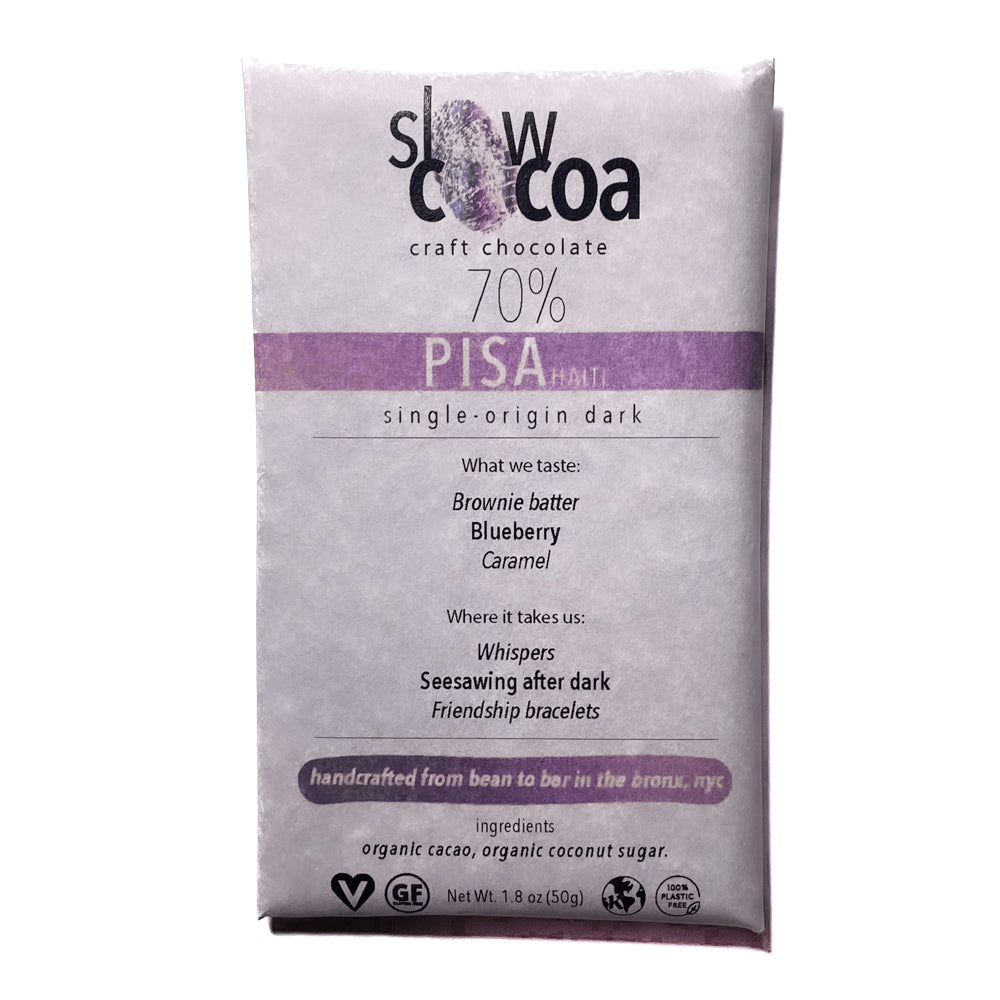70% PISA | coconut sugar
Fruity, chocolatey, with the gentle kiss of caramel or molasses.
This coconut sugar-sweetened take on our classic 70% PISA retains all the fruit-forward complexity that makes our Haitian-origin cacao a fan-favorite.
The unrefined coconut sugar conveys a little extra something, a natural sweetness we love in combination with the fruitiness of the cacao. Perhaps more subdued in acidity, and still rich in nuance, the extra notes of molasses or caramel transform this bar into more than the sum of its two parts.
For the extra adventurous: try both versions of our 70% PISA side by side. We love to isolate a single variable – in this case the sweetener – and change it, as a way to highlight how process informs flavor. (Note: sweetened with raw Colombian sugarcane, aka panela, the alternate version is still blissfully free from refined sugars.)
Craft a flavor journey of your own. Try a square of two bars, each with the same cacao origin, same percentage, same recipe. . . and guide yourself on a blind taste test.
You may be surprised just how different – or similar – the bars can be.
Organic Haitian cacao, organic coconut sugar.
Made in a fully vegan, gluten-free facility powered by 100% renewable wind energy.
PISA, or Produits Des Iles SA, is at the forefront of transforming the cacao processing and export landscape in Haiti. Before PISA stepped in, the norm in Haiti was for large exporters to buy unfermented, dried, low-grade cocoa from smallholder farmers at prices that didn't meet even the commodity market standards. This all changed in 2013 when PISA introduced a centralized processing facility, the first of its kind in Haiti, marking a significant shift in the country's cacao production.
Their vision was inspired by Haiti's neighbor, the Dominican Republic, known for its high-quality organic cacao. Under the guidance of Aline Etlicher and Fenise Pierre Antoine, PISA set out to mirror this success in Haiti. Their approach is inclusive, working with over 1,000 organic-certified smallholder producers, including 495 female producers in 2022 – a standout figure among a traditionally male-dominated industry. They buy wet cacao directly from these farmers at premium prices, process it centrally to enhance its quality, and then sell it as a superior product in the specialty cacao market.
PISA also played a pivotal role in establishing APROCANO, a producer association that oversees technical assistance and certification programs. Despite the considerable political and social upheavals in Haiti, especially in 2022, PISA persists in its remarkable mission to deliver top-notch organic Haitian beans to the craft chocolate market. Their cacao continually stands out, with a flavor profile that spans notes of classic chocolate, to almond butter, blackberries, blueberries and vanilla cream. We also love to note, thanks to the wonderful annual transparency reports from our sourcing partner Uncommon Cacao, that 95% of the central fermentation facility’s power is sourced from renewable solar.


